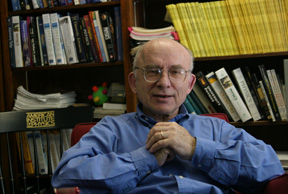Q&A: Hans von Baeyer on the order of things
 Hans Christian von Baeyer spoke to the William and 玛丽 News about his recent book, Information, as well as about what non-physicists need to know about our world. 以下是那次谈话的部分文字记录。 —Ed.
Hans Christian von Baeyer spoke to the William and 玛丽 News about his recent book, Information, as well as about what non-physicists need to know about our world. 以下是那次谈话的部分文字记录。 —Ed.
问:
Q: What would you tell a physics major?
von Baeyer: One article I wrote was about the lotus flower (The Sciences, January 2000). If I can relate physics to a lotus flower, that certainly enriches a physics major who has been dealing with little electronic machines all of his life.

von Baeyer:T
T
问:
Zeilinger’s principle, which becomes the last chapter of Information, says what is at the bottom is these qubits, these little balls of zero and one. Zeilinger doesn’t say that there is a world of atoms and there is our world and that we can’t communicate between them. That would be too depressing. What he says is that the world is really, truly made out of qubits and that our brains, our understanding, are such that out of every qubit we can pluck only one bit. That’s very interesting. It allows that the world is more complicated, and it acknowledges that we can talk only in bits. Each qubit can have an infinite amount of information, if you like, and all we can get out of it is one lousy bit. A great waste.
问:
Q: How does an understanding of qubits shape how you, as a physicist, see the world?
von Baeyer: After I published Information, I stopped for awhile, and I said, I’m not going to write another book. Then I got seduced and I started writing. I have a few chapters but I put them aside. It’s just too hard. What was that book about? It asks the question, In what way does a physicist see the world differently than do other people? An artist sees colors. A musician will be attuned to sounds. A psychologist sees facial expressions and such. The last chapter of my book will have to answer how I see the world differently now that I understand information. I don’t know the answer. I don’t know that I will write it.
This knowledge must creep in. The things that you know influence the way you appreciate the world. The fact that I think of the world as being made of qubits influences my appreciation, but it is a very difficult question. I’m not ready for that. Maybe after I retire, I’ll sit down … .
















